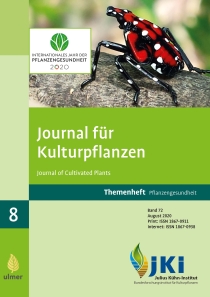Union regulated non-quarantine pests (RNQPs) in the new legislation of the EU on Plant Health: Background and consequences
DOI:
https://doi.org/10.5073/JfK.2020.08.04Keywords:
Non-quarantine pest, RNQP, phytosanitary measure, seeds, planting material, import, movement, official controlAbstract
The new legislation on plant health of the EU that has been applicable since December 14, 2019 (Regulation (EU) 2016/2031) (EU, 2016) defines the so-called “Union regulated non-quarantine pests” (RNQPs) for the first time. This brings the EU legislation in line with international standards. RNQPs occur in the EU, they spread mainly by plants for planting and it is assumed, that they can cause unacceptable economic impact in respect of the intended use of relevant planting material. The measures in the EU for RNQPs essentially aim at the supply of professional users with healthy seeds and planting material. For this, specified plant species must be free of relevant RNQPs during import and movement within the EU, or defined tolerance thresholds for an infestation must be observed. For certain RNQPs, there are also specific requirements to prevent their presence during production. Certification agencies or authorised plant producers and traders certify conformity with the requirements through the plant passport, which must be attached to the corresponding deliveries. Official controls ensure compliance with the RNQP regulations.
Downloads
Published
Issue
Section
License
The content of the journal is licensed under the Creative Commons Attribution 4.0 License. Any user is free to share and adapt (remix, transform, build upon) the content as long as the original publication is attributed (authors, title, year, journal, issue, pages).
The copyright of the published work remains with the authors. The authors grant the Journal of Cultivated Plants, the Julius Kühn-Institut and the OpenAgrar repository the non-exclusive right to distribute and exploit the work.







